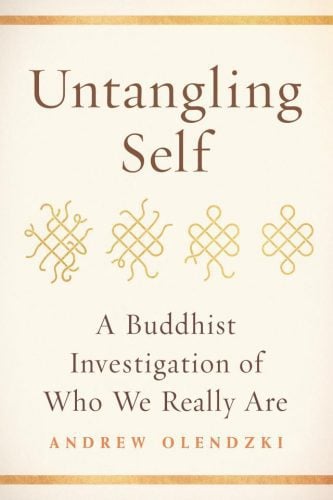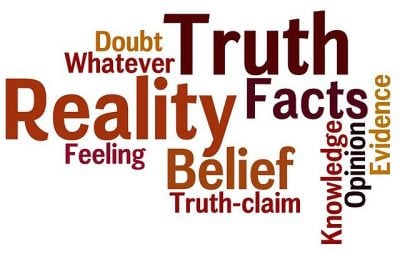Over the course of a lifetime, we will experience ten billion moments. Without mindfulness, will we squander them reaching for the future and dragging along the past? Who is it that spends these moments and how they’ll be spent will determine if the coming New Year is a happy one. 
Andrew Olendzki tackles these questions and more in his latest book, Untangling Self: A Buddhist Investigation of Who We Really Are.
This book is an accessible, beautifully written and compelling case for the Buddha’s teachings on self and the implications they have for our lives. This is a practical text–an invitation to start making the personal transformations that the Buddha showed was possible with the help of mindfulness.
For the reader familiar with the Buddha’ teachings, this book is a welcome refresher with some depth around Pali translation and an appeal to applying the dharma to not just individuals but to the wider world.
For the uninitiated, he carefully explains Buddhist concepts and, importantly, how to apply these concepts to your own experience. This book is immanently practical.
For me, it is wonderful to spend time again with Andy. It’s been a few years since his last powerful book, Unlimiting Mind, and many years since I studied with him at the Barre Center for Buddhist Studies.
Reading this book is also timely for me because I have been thinking, researching, and writing about the Buddha’s psychology of self and mindfulness for another book that I’ve been writing.
This teaching is a tough one for us to understand. The Buddha is often misconstrued as having said there is no self or that self was an illusion that should be discarded. His message was actually different. He wasn’t denying self, he was simply pointing out that the self as we tend to think of it is nowhere to be found.
The consequences of not self are far from trivial. What’s on the line is nothing short of happiness versus unhappiness, well-being versus despair, and a world destroyed by greed, hatred, and confusion versus one predominated by compassion, love, and peace.
The relentless and unreflected pursuit of self can only lead to misery, limitation, and damage to self, others, and the world in which we inhabit.
According to the Buddha, the self is a view, perspective or attitude applied the ongoing stream of experience that emerges from perception. Olendzki explains:
Perception is the function of the mind that creates meaning, that paints a pictures or constructs a model of what is going on every moment.
Each moment of perception is a discreet event, yet is experienced subjectively as a continuity. This is like the illusion that a now old-fashioned celluloid film creates. The movie is comprised of thousands of discrete images and what we see is the fluid movement of the film. This is because our visual perception groups the images together into that flow. In the same way, our mind takes the discreet moments of experience and clumps them together into a self that somehow owns them.
This metaphor self gives rise to a mistaken notion of self. Mindfulness can reveal how this is so.
The self as typically experienced has these properties: constancy, agency, ownership, survival, responsibility, and awareness. Olendzki provides a helpful explanation as to how each of them is not accurate when viewed under the microscope of mindfulness.
In terms of constancy, the Buddha’s personal phenomenological investigations demonstrated no such constancy of self. Rather he experienced the way that self arose out of the normal functioning of the mind. There was no unchanging essence that was unfailingly him.
The Buddha recognized that agency was lawful, just as everything else in experience. That is, the sense of agency arose out of conditioned experience just like everything else. Intentions can help to hack the system but there is no widespread agency within the system.
The self did not own experiences either. The Buddha said:
These feelings, these perceptions, these dispositions, these [moments of] consciousness—are not yours.
Ownership is a metaphorical projection from the material world, misappropriated to experience.
Whether or not one believes in rebirth or whether or not you focus upon the Buddha’s statements that seem to support the idea of rebirth (that is, his attestations of knowing his previous, voluminous lives), no sense of a personality would transfer from one body to another. Thus, the self is not an eternal disembodied spirit (atman).
The Buddha’s notion of personal responsibility, likewise, does not require a transcendent self. Responsibility operates along recognizable psychological principles, principally, dependent co-arising—the cause and effect of experience. Olendzki explains,
The intentions of one moment alter one’s dispositions, out of which the next moment’s intentions will be molded. This allows for radical though incremental, transformation of character, brought about by moment after moment of healthy rather than unhealthy action.
As for awareness, Olendzki clarifies,
Finally it is a widespread reflex of human thought that this node of awareness that yields the rich yet mysterious phenomenon of subjective, immediate experience must have sacred origins.
Here again, there is no need for divine intervention. Everything one needs is available in the phenomenological investigation of momentary experience.
Awareness, while seemingly immaterial, is a natural function and should be treated as such. Once these assumptions are challenged, the noun-like nature of the self dissolves into the unfolding process of the moment. There is no need to add anything, as the Buddha urged:
It is in tis fathom-long carcass, with its perceptions and thoughts, that the world (loka) arises and passes away.
There is no world out there that is not constructed, influenced by individual perception. It is human arrogance to assume that the world is the way it is. It is only that way to us, as beings with the psychophysical capacities that we have. Beyond these generic limitations, there is each individual’s psychology—based on temperament, personality, and a lifetime of learning.
The conclusion that Olendzki presents is a bit of shocker, turning our notion of cause and effect on its head
Rather than being the starting point of experience, the essential agent needed to have experience, self is regarded as the end product of an elaborate process of assimilating data, constructing meaning, and building a world of local experience.
Self is finally a category constructed by the mind. This process can be interrupted. Mindfulness can help us to break the habit of liking and disliking that arises from the routine experience of pleasure and pain. When we do so, we are freed from the dissatisfactions, sufferings, and anguishes of life.
Andy Olendzki’s book is thoughtful, concise, and powerful. It’s an authoritative treatment of the Buddha’s notion of self that is fresh, juicy, and alive. His writing voice is much like his teaching voice, lucid, warm, and inspiring.
This book is a rich resource for the most essential of the Buddha’s teachings–that there are no essences, especially self!
And, of course, Happy New Year! May it be one filled with mindfulness.

